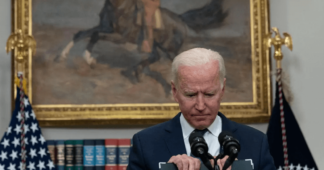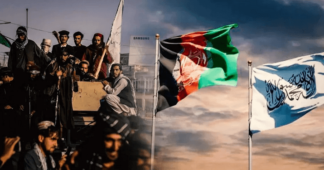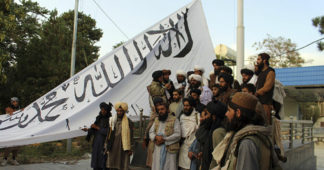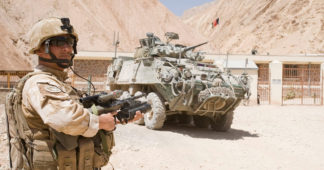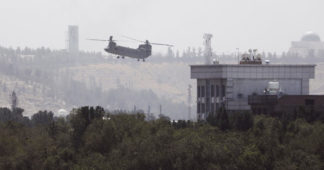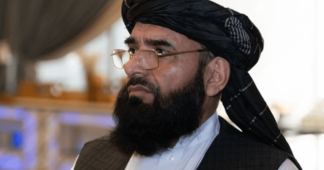August 23, 2021
Concern is growing over a broader humanitarian crisis across Afghanistan as people continue to crowd the Kabul airport to flee after the Taliban takeover of the country. The World Health Organization says about one-half of Afghanistan’s population, including nearly 10 million children, already need humanitarian assistance, and the numbers are expected to soar as Afghanistan’s economic crisis intensifies. The Taliban is now under intense pressure, says Emran Feroz, an Austro-Afghan journalist and author. “They know that any kind of Afghan state in future will be dependent on foreign money, which includes American money; otherwise, the people of Afghanistan and the state itself cannot survive,” says Feroz. “The Taliban must be really pragmatic and try to find a way to build a very inclusive government within a short time, because otherwise they will have a lot of problems.”
Transcript
AMY GOODMAN: This is Democracy Now!, democracynow.org, The War and Peace Report. I’m Amy Goodman.
President Biden and other G7 leaders are holding an emergency virtual meeting today to discuss the crisis in Afghanistan as the U.S. and other nations continue to airlift thousands of people trying to flee after the Taliban seized power. On Saturday, seven Afghan civilians, including a 2-year-old girl, died in a stampede as they attempted to enter the airport. Earlier today, an Afghan soldier was killed in a firefight at the airport. The United States is coordinating with the Taliban to keep access to the airport open, but there are numerous reports of Taliban fighters beating crowds trying to flee. U.S. national security adviser Jake Sullivan appeared on CNN Sunday and warned the Islamic State, which is an enemy of the Taliban, may try to attack the airport.
JAKE SULLIVAN: It is something that we are placing paramount priority on stopping or disrupting, and we will do everything that we can, for as long as we are on the ground, to keep that from happening. But we are taking it absolutely deadly seriously.
AMY GOODMAN: President Biden has suggested the U.S. may have to extend its presence in Afghanistan beyond August 31st to continue evacuations, but the Taliban said from Doha, where they’re negotiating with the United States, that doing so would cross a red line. Biden spoke on Sunday.
PRESIDENT JOE BIDEN: Altogether, we lifted approximately 11,000 people out of Kabul in less than 36 hours. It’s an incredible operation. Let me be clear: The evacuation of thousands of people from Kabul is going to be hard and painful, no matter when it started, when we began. It would have been true if we had started a month ago or a month from now. There is no way to evacuate this many people without pain and loss, of heartbreaking images you see on television. It’s just a fact. My heart aches for those people you see.
AMY GOODMAN: While the international media is focused on the crisis at the Kabul airport, concern is growing over a broader humanitarian crisis across Afghanistan. The World Health Organization says about one-half of the country’s population, including nearly 10 million children, already need humanitarian assistance, and the numbers are expected to soar as Afghanistan’s economic crisis continues. Last week, the United States blocked the Taliban from $9.5 billion held by the Afghan government in U.S. banks. The International Monetary Fund has also suspended Afghanistan’s access to funds. Earlier today, the WHO said it’s been unable to fly 500 tons of medical supplies into Afghanistan due to restrictions at the Kabul airport.
We’re joined now by Emran Feroz, an Austro-Afghan journalist and author. His most recent book has been published today in Germany. It’s called The Longest War: 20 Years of the War on Terror.
We’re speaking to you in Stuttgart, Emran, about two hours — right? — from Ramstein Air Force Base, where the United States has now evacuated thousands of Afghan refugees, also Americans, as they make their way out of Afghanistan. Can you first just respond to what took place in Afghanistan over these last few weeks? And then we’ll go back further.
EMRAN FEROZ: Of course. First of all, thanks for having me.
What happened in Afghanistan during the last weeks was that we saw a very surprising Taliban surge taking over provincial capitals, taking over more ground all over Afghanistan. And at the end, about one week ago, the Taliban were in front of Kabul. And many people were surprised. I think the CIA said that it would take 30 to 90 days until the Taliban will take over Kabul. At the end, it was just 24 hours.
And at the same time, we saw the installed regime in Kabul, U.S.-backed President Ashraf Ghani, running away with his close allied circle and, according to some reports, also taking a lot of money with him. Some of them are unconfirmed. There was a rumor spread by the Russian Embassy. But this is just a small detail. It was known that these people are very corrupt. And he fled, and the Taliban took over.
At the same time, we saw all these dramatic scenes at the Kabul airport, seeing all the crowds of Afghan people trying to leave the country, crowds which were attacked, harassed and everything — you know, very bad things, we can imagine — by U.S. forces, on one side, also by the Taliban, on the other side. And this mess didn’t stop until today.
AMY GOODMAN: So, Emran, in your piece in The American Prospect that’s headlined “The Whitewashing of the Afghan War,” you write, “Too many Western journalists and analysts are contemptuous of and insensitive to the people of the country that the U.S. had invaded. Their eyes focus only on the violence of the ‘other’ — the Taliban or ISIS or the broad catchall term ‘terrorists’ — while simultaneously ignoring the bloodshed and violence wrought by a Western occupation.” Can you talk about what is missing in the coverage in the West?
EMRAN FEROZ: Yes. As I just said, to many people, it was surprising, what happened in Afghanistan during the last days. But, actually, to people who followed closely, it wasn’t such a surprise. The provincial capitals, most of them, that have been captured by the Taliban during the last weeks, you know, it was kind of a domino effect that took place, but the Taliban did not come from nowhere. They were in these areas for many years. They were in the districts, in the rural areas, close to the provincial capitals. And it was a matter of time until they showed themselves and revealed themselves from the shadows — the shadows, you know, because the Taliban had in all these areas so-called shadow governance. They had their parallel structures. Everything was already there. And a lot of people did not focus on it, or they just wanted to ignore it. It was even the same in the case of Kabul, because it just took a short drive from the capital to a rural village, you know, like 20 minutes, 30 minutes, something like that, and you would have already noticed a Taliban influence over there. So, indeed, in many rural areas of Afghanistan, the Taliban could manifest themselves, and they could also find a lot of support.
And this is something that I also meant in the piece, because now we all see these scenes, you know, of American soldiers evacuating children, women, and all these emotional pictures. It is a painting of black and white, the good guys versus the bad guys, and things are rather complex on the ground, actually. And all these rural areas where the Taliban were able to gain ground during the last years were heavily affected by the U.S. war, by the NATO war, that took place during the last two decades in Afghanistan and caused a lot of civilian casualties. Many people were drone bombed. Afghanistan was the most drone bombed country in the world for almost two decades, and almost nobody talked about it. You already mentioned Ramstein, Amy, here in Germany. Also other states, especially Germany, were accomplices, and they supported the brutal war on terror that took place in Afghanistan and elsewhere.
And what we nowadays often see is that, you know, we see also in the media, in my opinion, often very privileged Afghans who talk about the failure of the West, and they’re blaming them for all the mess, which is right, but it is just half of the story. There are actually many people within Afghanistan who suffered a lot, who were victims of corruption, massive corruption that took place in Kabul, which was fueled by the Americans and the regime, which was never a democratic regime. And the victims of all these developments, a lot of them became radicalized. They became angry. And not all of them, but I think a lot of them, as I have seen on the ground in many different areas of the country, already also joined the Taliban and supported their cause.
AMY GOODMAN: There is an unusual scene going on, some descriptions with the Taliban being the first vetters of the Afghanis who want to get into the airport, right outside, working with the U.S. forces, the first vetters of their documents. Now, mind you, these people from Afghanistan are fleeing them. Can you talk about the relationship between the Taliban and the United States, who have been negotiating for months in Doha? That last statement from the Taliban, saying, “You cannot go past August 31st,” to the U.S. government, is actually from Doha. But the Afghan government, Ashraf Ghani, was completely excluded from all these negotiations. So, was it such a surprise that in the end he ran?
EMRAN FEROZ: Exactly. I mean, what the Taliban could do, during the last years also, especially through the help of U.S. special envoy Zalmay Khalilzad, who has Afghan roots himself, and the Trump administration, was to sign this deal, which was signed in Qatar about one year ago, one-and-a-half year ago. And this was a huge success for the Taliban, you know, on the political field internationally. They gained a lot of legitimacy through this deal.
And actually, it was sometimes really surprising how the Americans reacted, how Donald Trump reacted back then. For example, the Taliban said, “We don’t want to talk with the Kabul government. We don’t want to talk with the puppets. We want to talk to the puppet masters” — was literally what they said. And the Americans agreed to that. So, they agreed to that. And we also had this very strange phone call of Donald Trump, who called Mullah Baradar, the Taliban leader, you know, the leader of the political office of the Taliban in Doha, and started to talk with him without any protocol, it seems. I mean, it was also Mr. Khalilzad himself who was present there. But afterwards, the headlines were really somehow funny, actually, because —
AMY GOODMAN: When did Trump make that call?
EMRAN FEROZ: I think that Donald Trump had the specific policies of, like — it seems that his relationship to Ashraf Ghani was kind of broken. He didn’t respect Ashraf Ghani. He didn’t respect the guy who wanted money from the U.S. He respected the guys much more who fought against the U.S. successfully and who were alpha males like him. And that’s why he also said to the Taliban leader, “Hey, you guys, actually, you are tough people.” That’s what he said.
And, of course, all these things led to what we see now, because at the same time, as you mentioned, the Afghan government was excluded from the talks, and, actually, it was necessary to have all these different players on the ground talking with each other because this would have been the aim of intra-Afghan talks. The deal was just — you know, the withdrawal deal with the U.S. was focusing on the withdrawal, but the Taliban also assured that they would participate into intra-Afghan talks. Unfortunately, these talks were sabotaged by both sides, actually. The Taliban continued attacking Afghan forces and Afghan civilians. At the same time, the Afghan government of Ashraf Ghani, they didn’t want to release more prisoners, and they also found all kinds of different reasons to not participate in the talks and to not lose power and money, of course. But at the end, they lost all of it.
AMY GOODMAN: So, Emran Feroz, if you can talk about now this warning issued by the Taliban the U.S. cannot go past August 31st? You’ve got thousands of people making their way to the airport, at the airport now. President Biden has invoked a wartime act to get commercial airlines to come to evacuate people. But it’s not clear it can all happen in the next eight days. What do you see possibly happening? And how do you feel about the international financial institutions cutting off money to the Afghan government because it’s Taliban right now, as the country continues to descend into a humanitarian crisis?
EMRAN FEROZ: How I feel at the moment, you know, is not just about my job doing — you know, concerning my job regarding Afghanistan as a journalist, but also emotionally it’s really difficult because of all the things that are happening.
So, I think that the Taliban, they know that any kind of Afghan state in future will be dependent on foreign money, which includes American money; otherwise, the people of Afghanistan and the state itself cannot survive. So the Taliban must be really pragmatic and try to find a way to build a very inclusive government within a short time, because otherwise they will have a lot of problems, not just with their donors, but also with their own population, because it will be the population, the Afghans — most of the Afghans are not running to the airport to flee. Most of them are forced to stay in the country. And for them, it will be very, very difficult to live under these sanctions. I already talked to a lot of people over there who don’t have money. I can’t send money to my relatives. I can’t support them at the moment, because MoneyGram, Western Union and all these other money wire institutions, they are shut down. They’re not working at the moment. And people are becoming more angry, and they feel much more helpless.
So, the international community and also NGOs, international organizations, the Red Cross, etc., all these different players, they need to focus on the Afghans, on the Afghan population, and not letting them alone again with the Taliban. At the same time, I think that financial aid can be a very useful tool to use it also to put some pressure, political pressure, on the Taliban, because, if we want it or not, in the future we will see more more and more governments working with them.
AMY GOODMAN: I want to thank you, Emran Feroz, for joining us, Austro-Afghan journalist and author. Most recent book, published today in Germany, it’s titled The Longest War: 20 Years of the War on Terror.
Published at www.democracynow.org
